Abstract
A program to involve institutional staff in developing manual sign language skills with profoundly retarded persons was evaluated. In Experiment 1, six direct care staff, with close supervision, taught a small repertoire of signs to six profoundly retarded residents who had not benefited from previous training in vocal language. Training was conducted in a group format using instructions, modeling, manual guidance, contingent reinforcers, and feedback. During training, all residents learned to identify pictures of objects with manual signs. Generalization observations during unstructured times on the residents' living unit indicated that staff used their signing skills with the residents in addition to their vocal interactions but the residents did not increase their signing or vocalizing. In Experiment 2, the residents' skills in signing with real objects on their living unit as opposed to pictures of objects were evaluated and provided with additional training where necessary. Results indicated that all participating residents learned to communicate with signing during structured interactions on their living unit, and the skills maintained during follow-up assessments ranging from 39 to 49 weeks. Results are discussed regarding the variable generalization effects noted as well as the general benefits and disadvantages of teaching manual signing skills to profoundly retarded persons.
Full text
PDF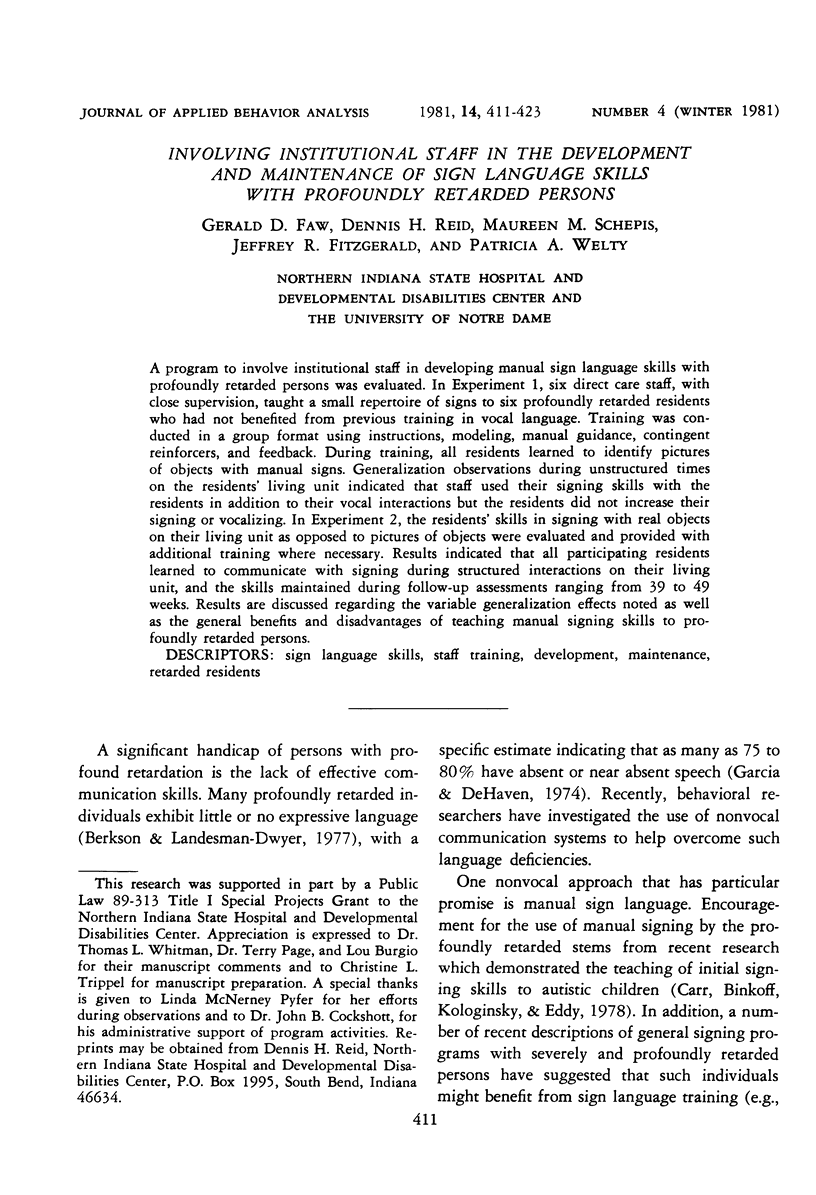
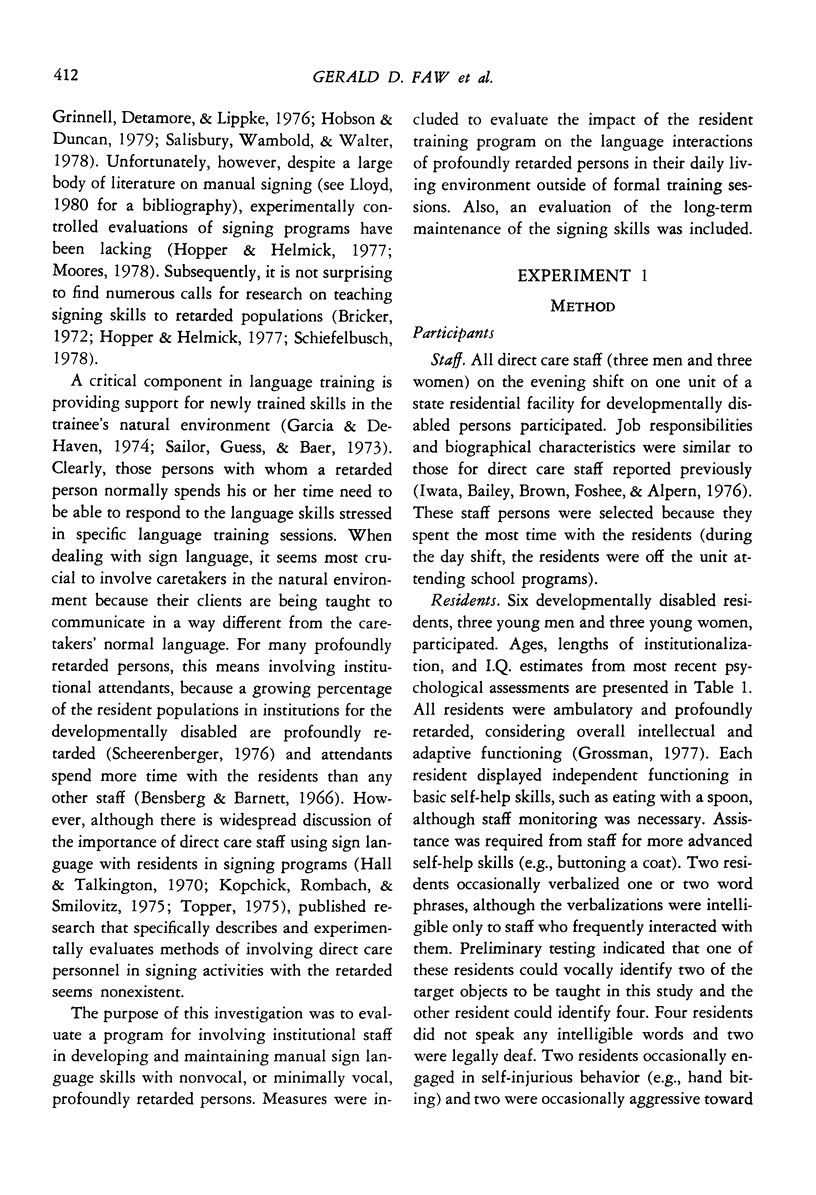
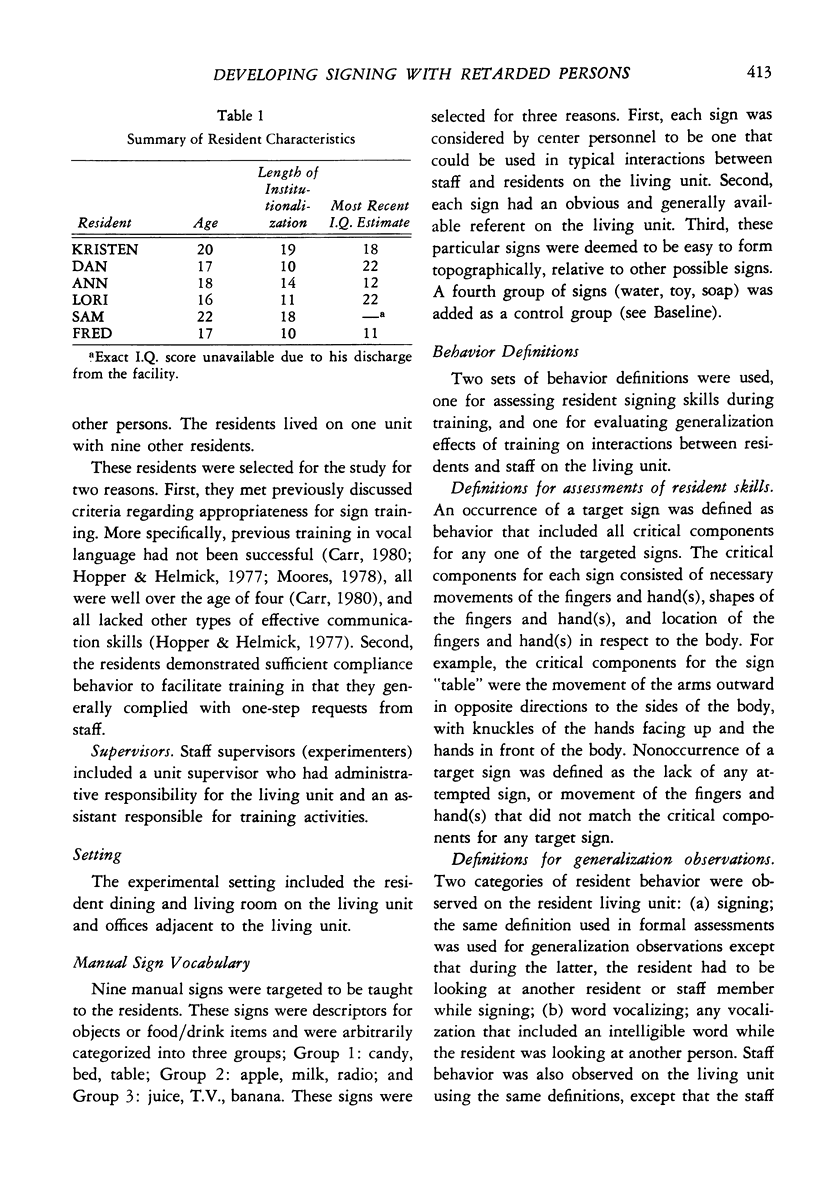
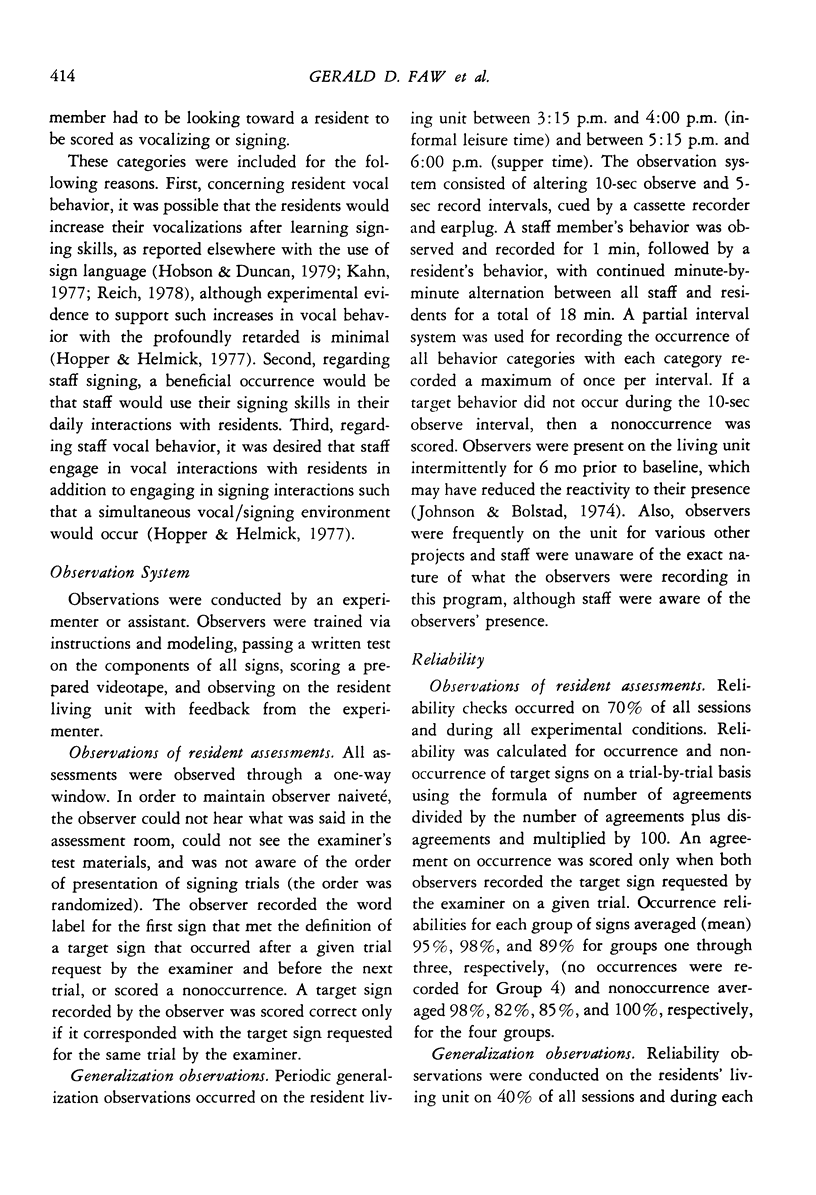
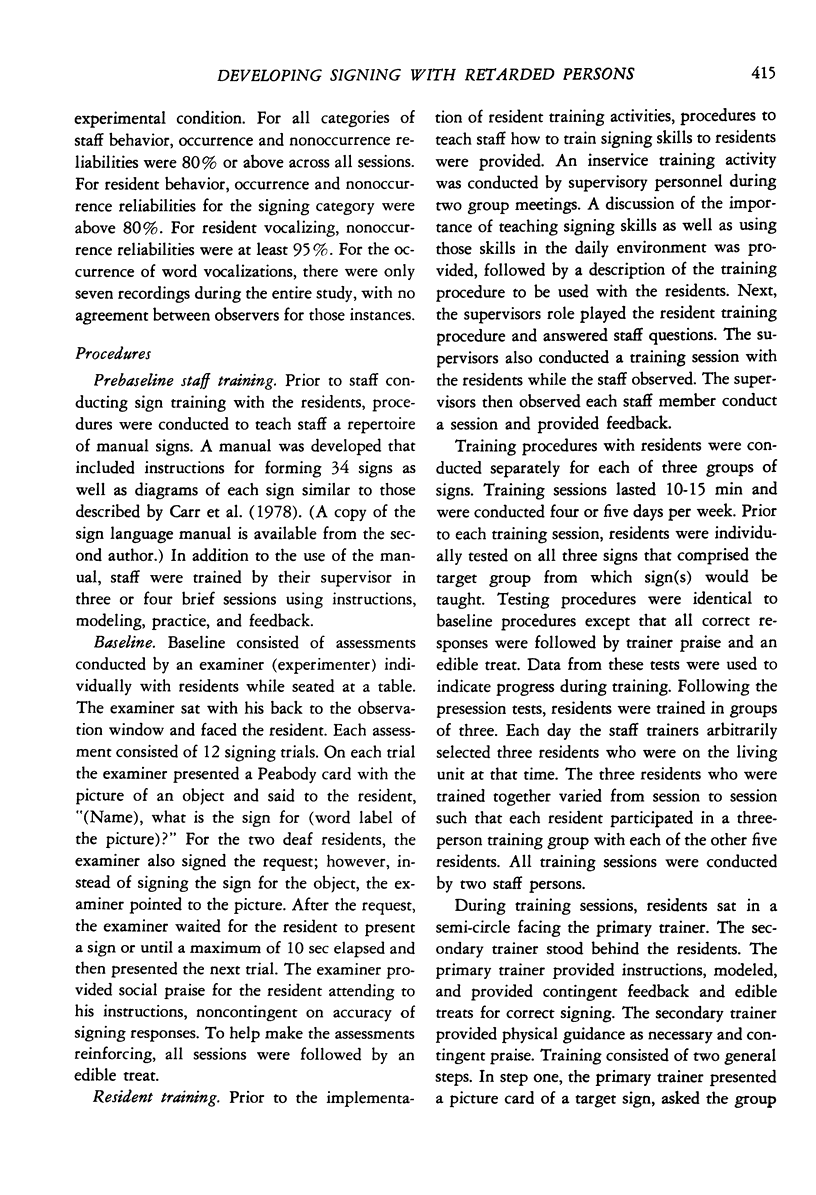
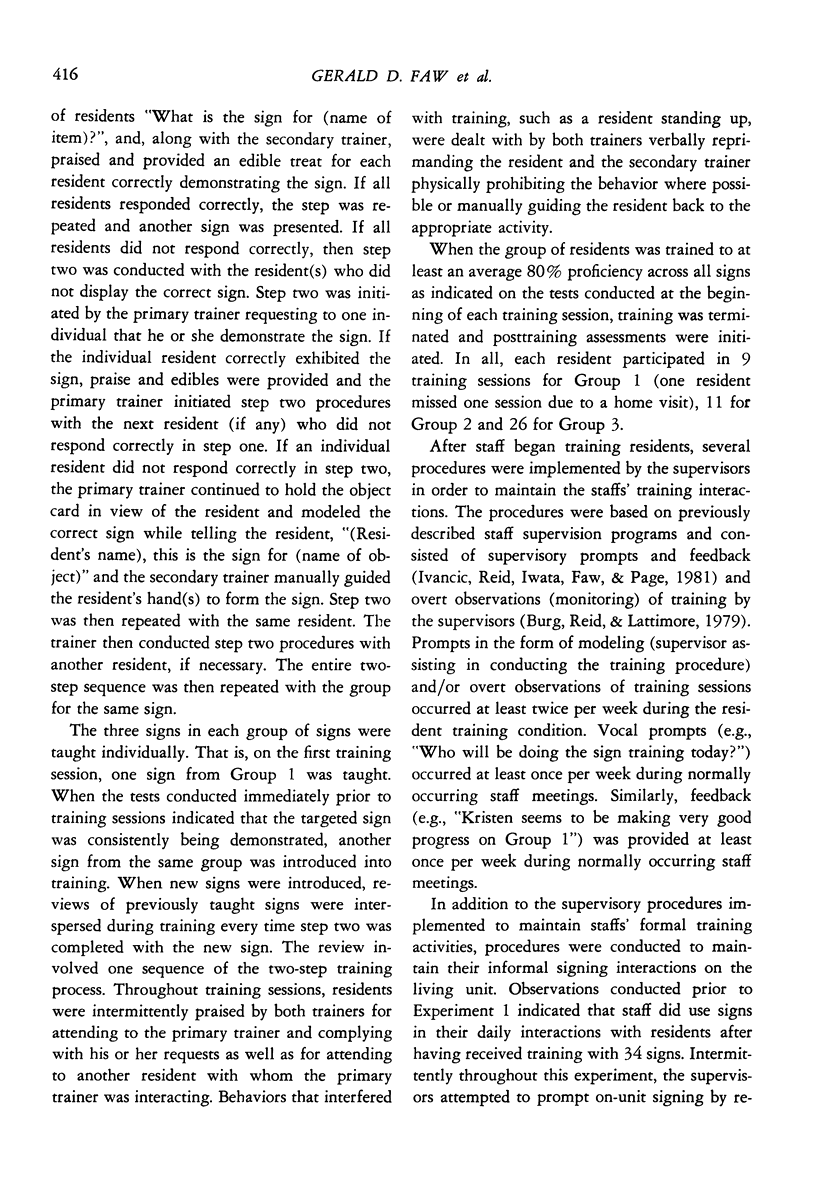
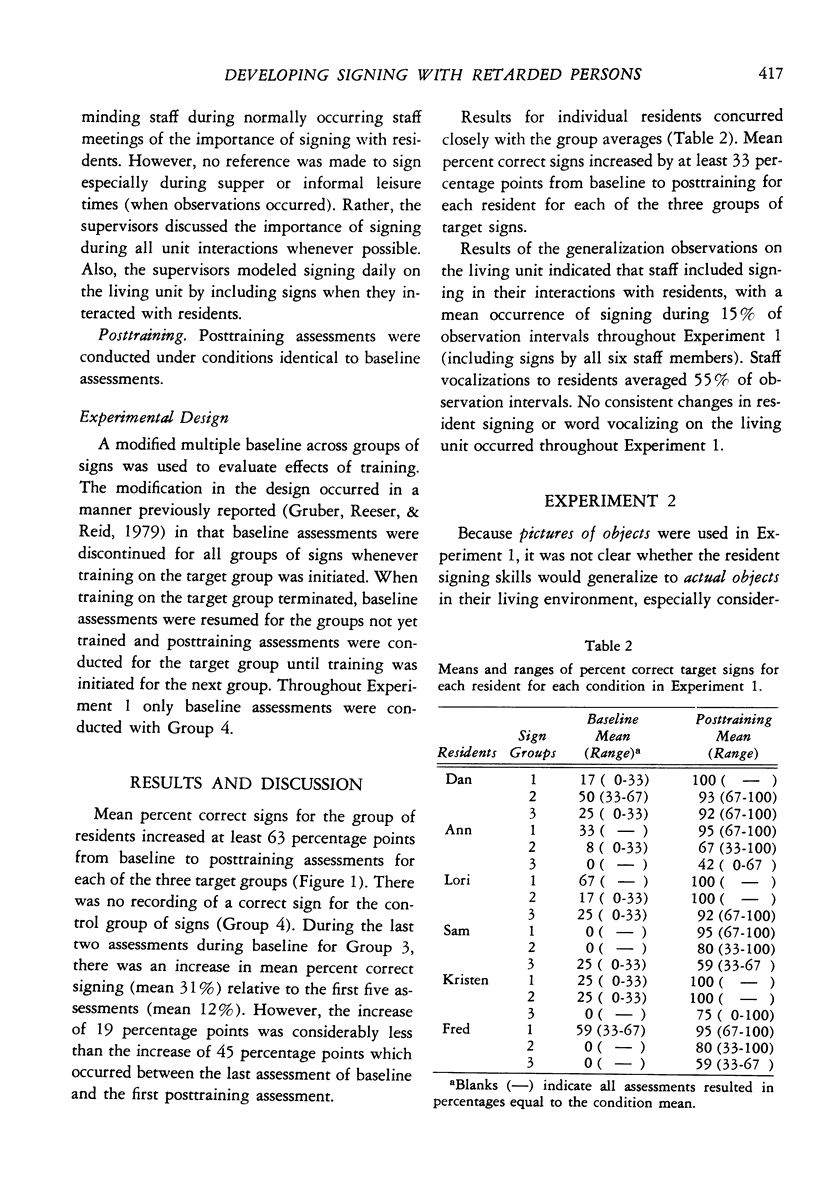
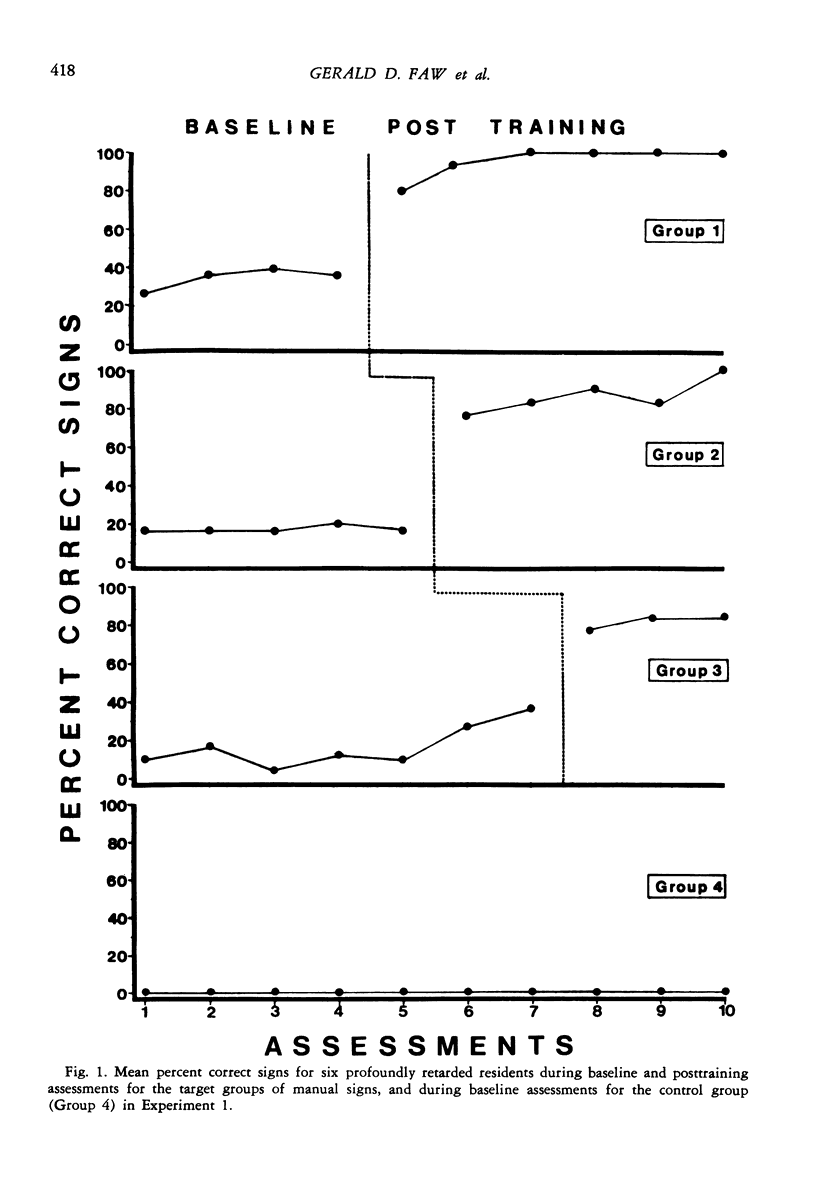
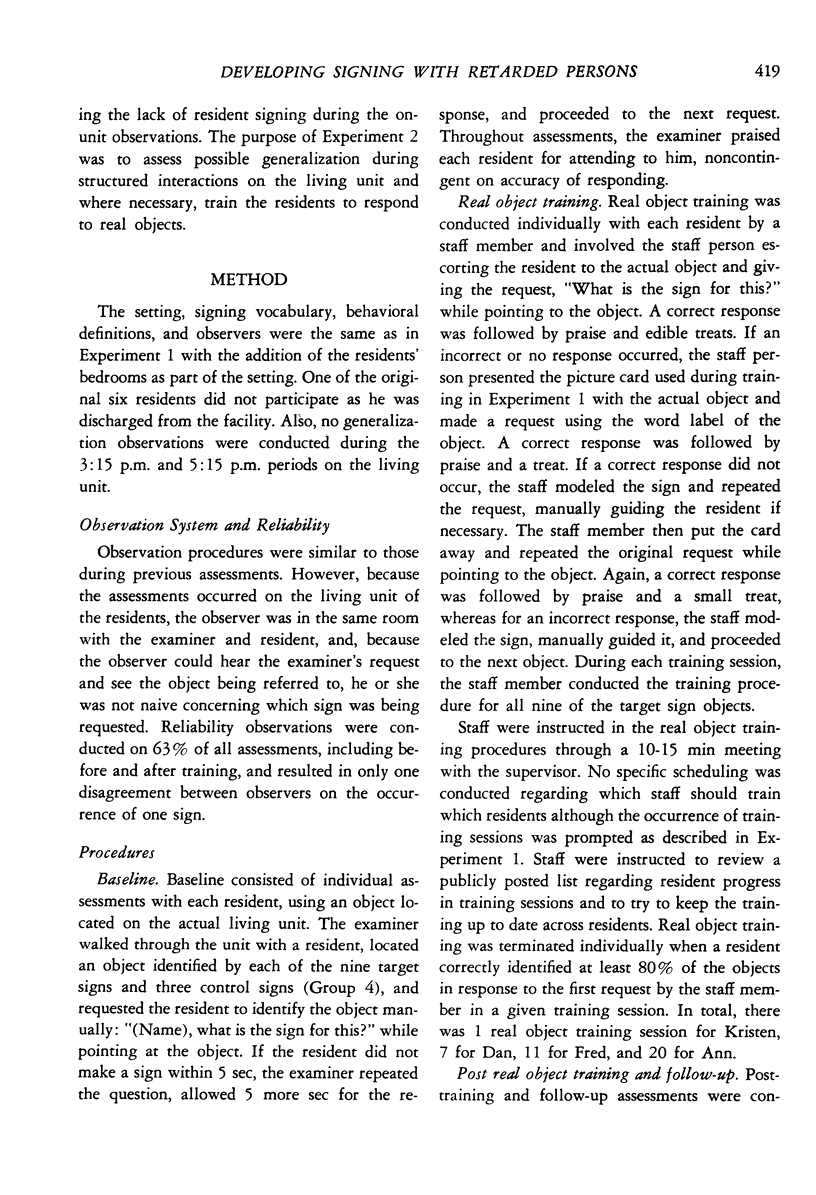
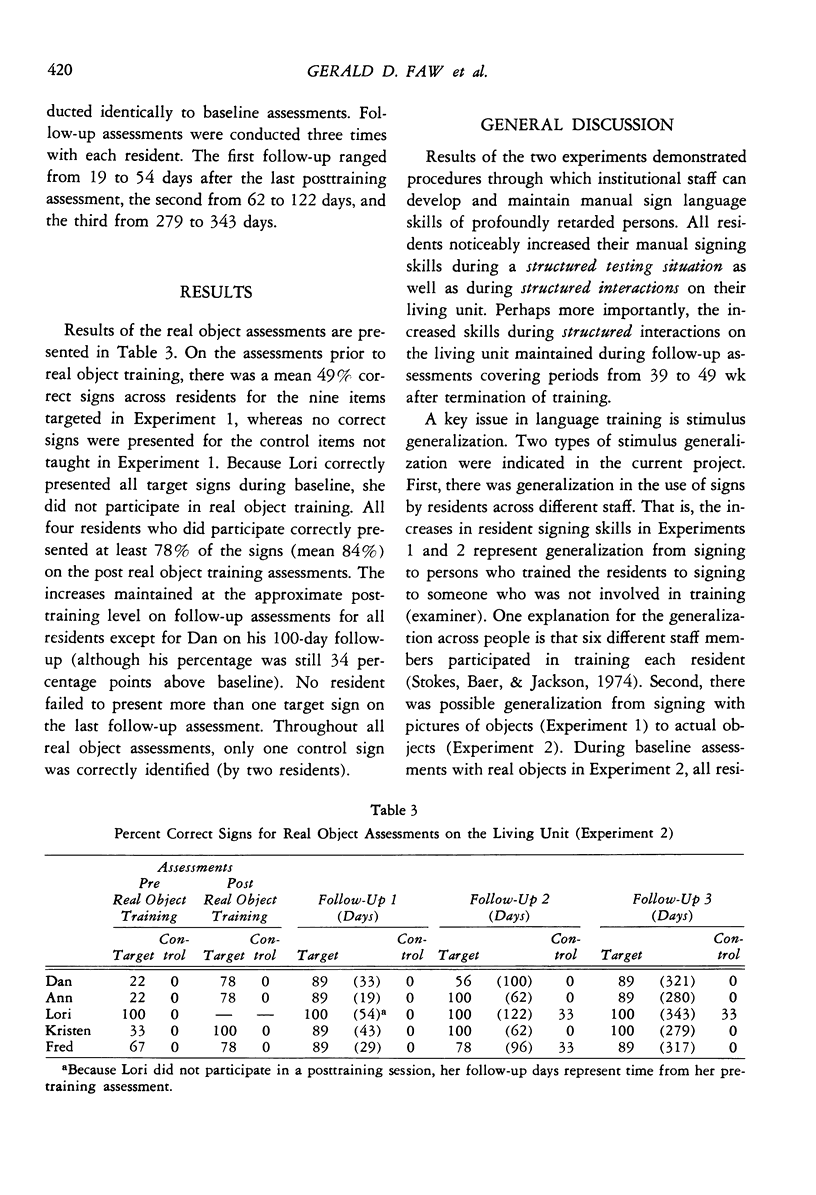
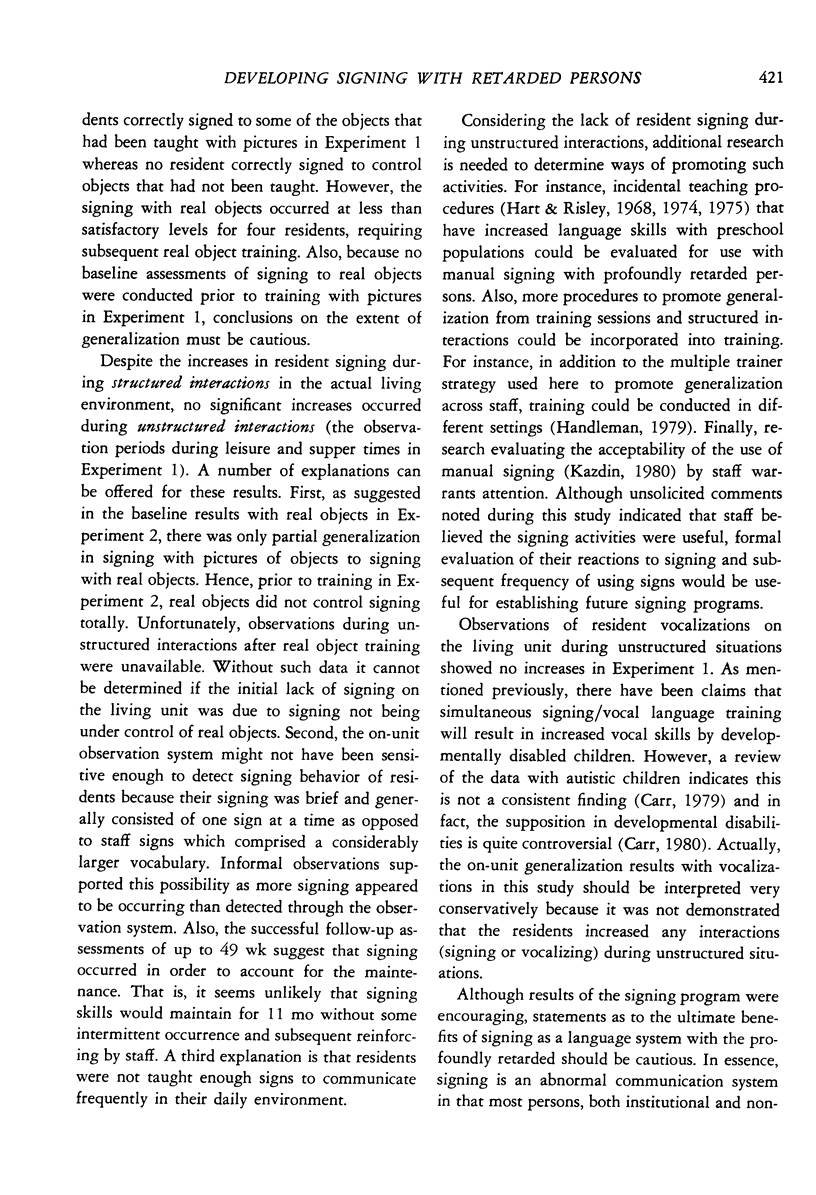
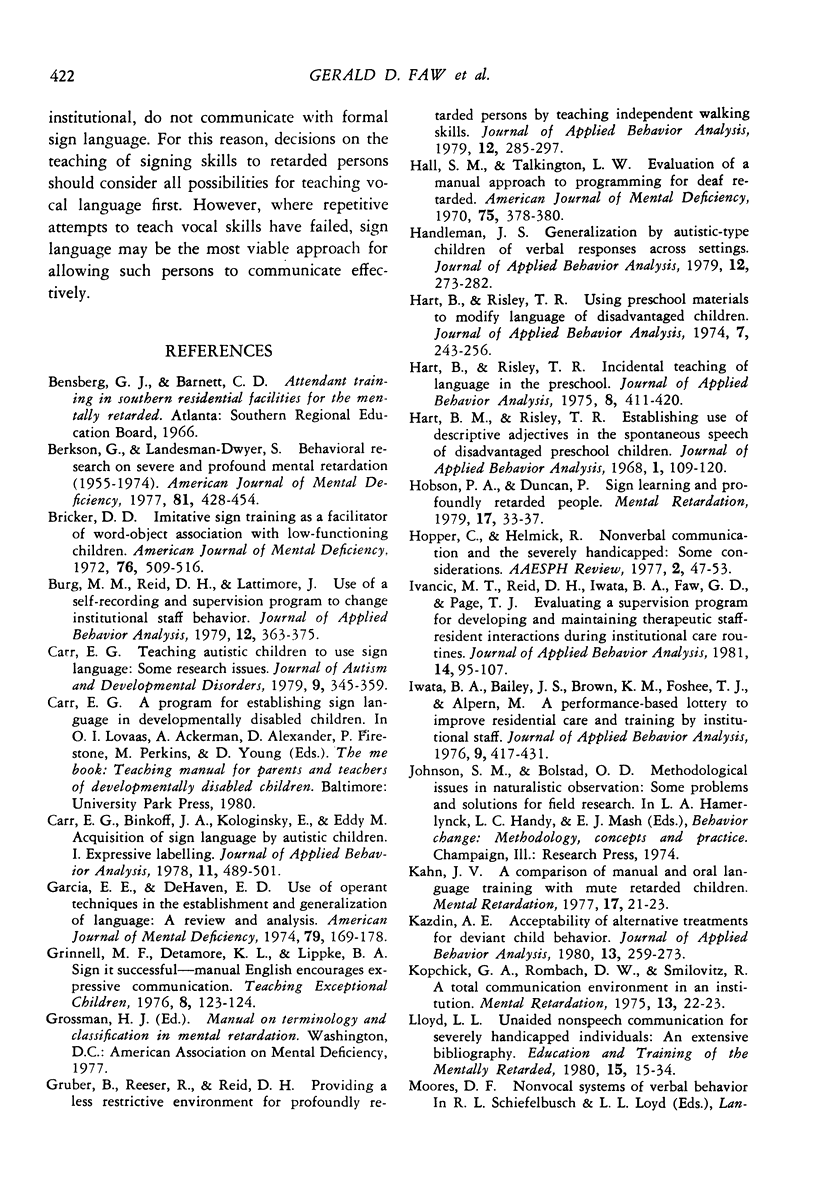
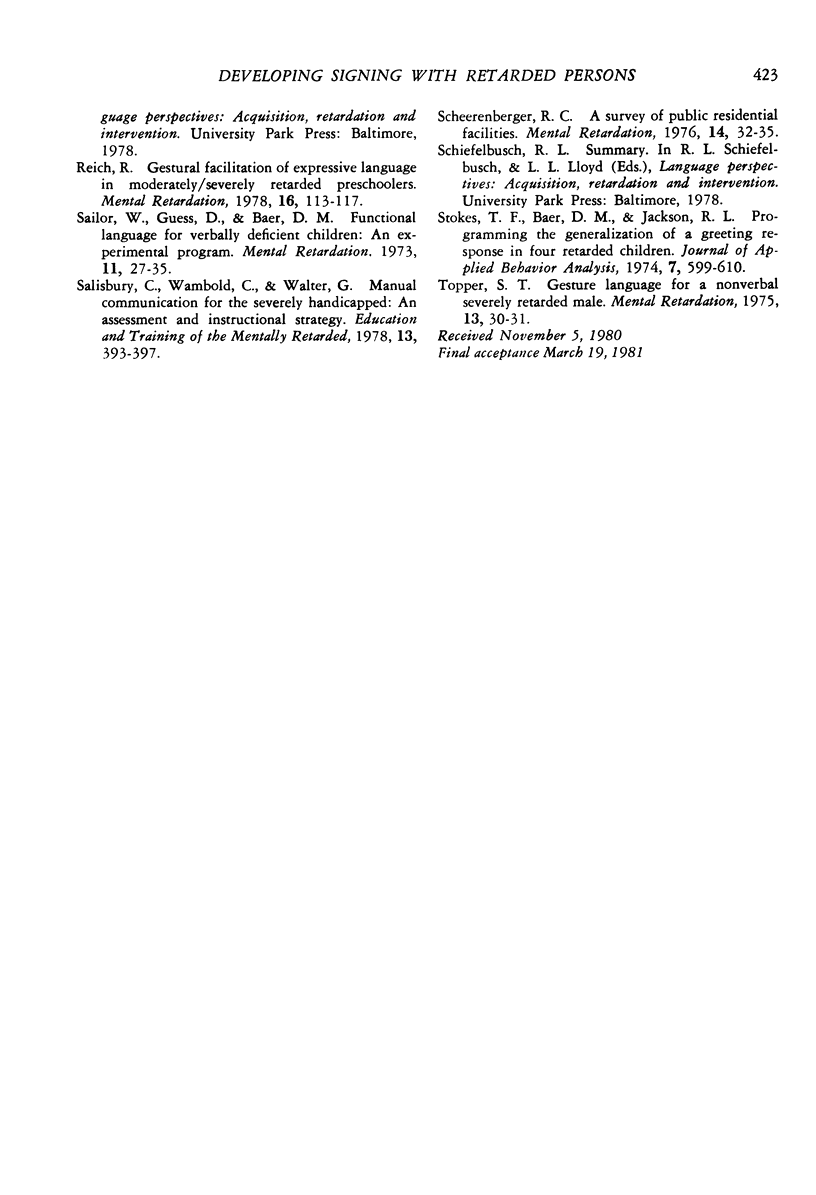
Selected References
These references are in PubMed. This may not be the complete list of references from this article.
- Berkson G., Landesman-Dwyer S. Behavioral research on severe and profound mental retardation (1955--1974). Am J Ment Defic. 1977 Mar;81(5):428–454. [PubMed] [Google Scholar]
- Bricker D. D. Imitative sign training as a facilitator of word-object association with low-functioning children. Am J Ment Defic. 1972 Mar;76(5):509–516. [PubMed] [Google Scholar]
- Burg M. M., Reid D. H., Lattimore J. Use of a self-recording and supervision program to change institutional staff behavior. J Appl Behav Anal. 1979 Fall;12(3):363–375. doi: 10.1901/jaba.1979.12-363. [DOI] [PMC free article] [PubMed] [Google Scholar]
- Carr E. G. Teaching autistic children to use sign language: some research issues. J Autism Dev Disord. 1979 Dec;9(4):345–359. doi: 10.1007/BF01531444. [DOI] [PubMed] [Google Scholar]
- Garcia E. E., DeHaven E. D. Use of operant techniques in the establishment and generalization of language: a review and analysis. Am J Ment Defic. 1974 Sep;79(2):169–178. [PubMed] [Google Scholar]
- Gruber B., Reeser R., Reid D. H. Providing a less restrictive environment for profoundly retarded persons by teaching independent walking skills. J Appl Behav Anal. 1979 Summer;12(2):285–297. doi: 10.1901/jaba.1979.12-285. [DOI] [PMC free article] [PubMed] [Google Scholar]
- Hall S. M., Talkington L. W. Evaluation of a manual approach to programming for deaf retarded. Am J Ment Defic. 1970 Nov;75(3):378–380. [PubMed] [Google Scholar]
- Handleman J. S. Generalization by autistic-type children of verbal responses across settings. J Appl Behav Anal. 1979 Summer;12(2):273–282. doi: 10.1901/jaba.1979.12-273. [DOI] [PMC free article] [PubMed] [Google Scholar]
- Hart B. M., Risley T. R. Establishing use of descriptive adjectives in the spontaneous speech of disadvantaged preschool children. J Appl Behav Anal. 1968 Summer;1(2):109–120. doi: 10.1901/jaba.1968.1-109. [DOI] [PMC free article] [PubMed] [Google Scholar]
- Hart B., Risley T. R. Incidental teaching of language in the preschool. J Appl Behav Anal. 1975 Winter;8(4):411–420. doi: 10.1901/jaba.1975.8-411. [DOI] [PMC free article] [PubMed] [Google Scholar]
- Hart B., Risley T. R. Using preschool materials to modify the language of disadvantaged children. J Appl Behav Anal. 1974 Summer;7(2):243–256. doi: 10.1901/jaba.1974.7-243. [DOI] [PMC free article] [PubMed] [Google Scholar]
- Hobson P. A., Duncan P. Sign learning and profoundly retarded people. Ment Retard. 1979 Feb;17(1):33–37. [PubMed] [Google Scholar]
- Ivancic M. T., Reid D. H., Iwata B. A., Faw G. D., Page T. J. Evaluating a supervision program for developing and maintaining therapeutic staff-resident interactions during institutional care routines. J Appl Behav Anal. 1981 Spring;14(1):95–107. doi: 10.1901/jaba.1981.14-95. [DOI] [PMC free article] [PubMed] [Google Scholar]
- Iwata B. A., Bailey J. S., Brown K. M., Foshee T. J., Alpern M. A performance-based lottery to improve residential care and training by institutional staff. J Appl Behav Anal. 1976 WINTER;9(4):417–431. doi: 10.1901/jaba.1976.9-417. [DOI] [PMC free article] [PubMed] [Google Scholar]
- Kahn J. V. A comparison of manual and oral language training with mute retarded children. Ment Retard. 1977 Jun;15(3):21–23. [PubMed] [Google Scholar]
- Kazdin A. E. Acceptability of alternative treatments for deviant child behavior. J Appl Behav Anal. 1980 Summer;13(2):259–273. doi: 10.1901/jaba.1980.13-259. [DOI] [PMC free article] [PubMed] [Google Scholar]
- Kopchick G. A., Jr, Romback D. W., Smilovitz R. A total communication environment in an institution. Ment Retard. 1975 Jun;13(3):22–23. [PubMed] [Google Scholar]
- Reich R. Gestural facilitation of expressive language in moderately/severely retarded preschoolers. Ment Retard. 1978 Apr;16(2):113–117. [PubMed] [Google Scholar]
- Scheerenberger R. C. A study of public residential facilities. Ment Retard. 1976 Feb;14(1):32–35. [PubMed] [Google Scholar]
- Stokes T. F., Baer D. M., Jackson R. L. Programming the generalization of a greeting response in four retarded children. J Appl Behav Anal. 1974 Winter;7(4):599–610. doi: 10.1901/jaba.1974.7-599. [DOI] [PMC free article] [PubMed] [Google Scholar]
- Topper S. T. Gesture language for a non-verbal severely retarded male. Ment Retard. 1975 Feb;13(1):30–31. [PubMed] [Google Scholar]


